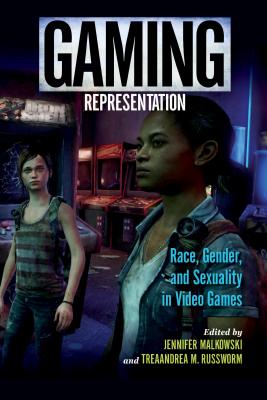Gaming Representation offers a timely and interdisciplinary call for greater inclusivity in video games. The issue of equality transcends the current focus in the field of Game Studies on code, materiality, and platforms. Journalists and bloggers have begun to hold the digital game industry and culture accountable for the discrimination routinely endured by female gamers, queer gamers, and gamers of color. Video game developers are responding to these critiques, but scholarly discussion of representation in games has lagged behind. Contributors to this volume examine portrayals of race, gender, and sexuality in a range of games, from casuals like Diner Dash, to indies like Journey and The Binding of Isaac, to mainstream games from the Grand Theft Auto, BioShock, Spec Ops, The Last of Us, and Max Payne franchises. Arguing that representation and identity function as systems in games that share a stronger connection to code and platforms than it may first appear, Gaming Representation pushes gaming scholarship to new levels of inquiry, theorizing, and imagination.
| FindBook |
有 2 項符合
Gaming Representation: Race, Gender, and Sexuality in Video Games的圖書 |
 |
Gaming Representation: Race, Gender, and Sexuality in Video Games 作者:Jennifer(EDT)/Russworm,Malkowski,Treaandrea M.(EDT) 出版社:Jennifer (EDT)/ Russworm,Malkowski,Treaandrea M. (EDT) 出版日期:2017-07-03 |
| 圖書館借閱 |
| 國家圖書館 | 全國圖書書目資訊網 | 國立公共資訊圖書館 | 電子書服務平台 | MetaCat 跨館整合查詢 |
| 臺北市立圖書館 | 新北市立圖書館 | 基隆市公共圖書館 | 桃園市立圖書館 | 新竹縣公共圖書館 |
| 苗栗縣立圖書館 | 臺中市立圖書館 | 彰化縣公共圖書館 | 南投縣文化局 | 雲林縣公共圖書館 |
| 嘉義縣圖書館 | 臺南市立圖書館 | 高雄市立圖書館 | 屏東縣公共圖書館 | 宜蘭縣公共圖書館 |
| 花蓮縣文化局 | 臺東縣文化處 |
|
|
圖書介紹 - 資料來源:博客來 評分:
圖書名稱:Gaming Representation: Race, Gender, and Sexuality in Video Games
Theology, Religion, and Dungeons & Dragons: Explorations of the Sacred Through Fantasy Worlds
Expressive Iteration: Designing for Meaningful Routines
Expressive Iteration: Designing for Meaningful Routines
Mindfulness Word Search for Adults Large Print: Word Search Puzzle Book for Adults, Word Find Book for Adults, Relaxation Word Search Book
Master of Manga: A Magical Coloring Book
Deadly Blooms: Explore Therapeutic Plant Designs and Fascinating Historical Tidbits While Enjoying Stress Relief Coloring Pages in th
Culinary Palette Calming Food Coloring Pages: Discover Stress Relief with Food-Themed Coloring Pages Featuring Recipes and Cooking Tips
The Abundant Life Journal: A 30-Week Devotional for Mindfulness and Restoration
Mangatopia: Sea Creatures: An Underwater Coloring Book of Anime and Manga
Barbie Word Search, Quips, Quotes, and Coloring Book
Expressive Iteration: Designing for Meaningful Routines
Expressive Iteration: Designing for Meaningful Routines
Mindfulness Word Search for Adults Large Print: Word Search Puzzle Book for Adults, Word Find Book for Adults, Relaxation Word Search Book
Master of Manga: A Magical Coloring Book
Deadly Blooms: Explore Therapeutic Plant Designs and Fascinating Historical Tidbits While Enjoying Stress Relief Coloring Pages in th
Culinary Palette Calming Food Coloring Pages: Discover Stress Relief with Food-Themed Coloring Pages Featuring Recipes and Cooking Tips
The Abundant Life Journal: A 30-Week Devotional for Mindfulness and Restoration
Mangatopia: Sea Creatures: An Underwater Coloring Book of Anime and Manga
Barbie Word Search, Quips, Quotes, and Coloring Book
|











